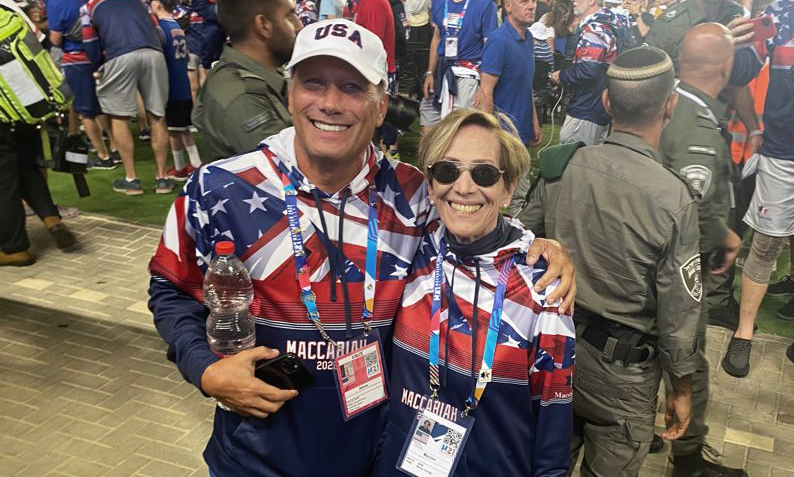
Written By Sam Oshtry
The Maccabiah takes place every four years in Israel and is a time to celebrate Jewish athletes across the world as they compete in various sporting events. But it is also an opportunity to connect generations of Maccabiah athletes and staff.
That’s no different for Maccabi USA, which welcomed Marilyn Kaplan as an honorary member at the 2022 opening ceremony, where she walked out with the United States delegation.
Kaplan was not an athlete participating in the Games. Not in 2022. Not ever. But her role with Maccabi USA was paramount in the late 1990s and her presence at the 21st Maccabiah last summer connected decades of history at the Maccabiah. She represents the tragedy and triumph in sports, and embodies what the Maccabiah stands for.
Kaplan was a Maccabi USA delegation member in 1997 and was in Israel when a bridge collapsed over the Yarkon River during the opening ceremony, killing four Australian athletes and injuring more than 70 others. That moment will forever live in her memory.
At the 2022 Games this past summer, Kaplan, 92, walked in the opening ceremony – a special opportunity she was deprived of 25 years earlier. She was the most senior person in the U.S. delegation which consisted of more than 1,300 members.
“The Maccabiah Games is something very, very unique. It’s very special,” Kaplan said.
In the late 90s, Kaplan was a member of the Maccabi USA national board when she was invited to attend the opening ceremony in Tel Aviv for the 1997 games. Kaplan, and the entire USA delegation, was in a staging area across the street from Ramat Gan Stadium, the arena where thousands of people would soon walk across a stage on what should have been a joyous night.
Instead, it was a tragic evening. Delegation members were tasked with walking across a bridge over the Yarkon River to get from the holding area to the stadium. As the Australian delegation marched on the bridge, it collapsed and sent dozens of people into the water.
Kaplan never walked in the opening ceremony that night. She did, however, cross the bridge a few days earlier when she and a friend went for a walk. Kaplan recalls making a comment to her friend about the unsteadiness and “tremble” in the bridge as they wandered across it. It was an off-hand remark that foreshadowed tragedy days later.
At the time, Kaplan was not aware that thousands of people would be expected to cross that bridge to enter the opening ceremony. She forgot about her remark entirely until the collapse and says if she knew, she surely would have said something.
The events haunted Kaplan and she distanced herself from Maccabi USA in the years that followed.
“We were very upset about what happened and I kind of withdrew,” Kaplan said.
Kaplan knew she eventually wanted to go back after the tragic events of the ‘97 Games and described walking in the opening ceremony as an “unfulfilled wish.” It didn’t become a real possibility until her son, Kenny Greene, tried out for the Masters tennis team.
Kaplan had been trying to convince her son to play in the Games for two decades. Leading up to the tennis tryouts for the 21st Maccabiah, Kaplan made her final pitch over dinner. She reminded Greene she would be 92 and he would be 65 when the Games started.
“Our window is getting very small,” Greene recalls his mother telling him. “Why don’t you try it? I’ve been asking you forever to do this.”
After Kaplan explained to her son how incredible of an experience it would be to combine his love for tennis with his Jewish identity, Greene agreed.
Greene tried out and made the team, booking him a ticket to Israel in the summer of 2022. While that guaranteed him a chance to walk in the opening ceremony, it did not guarantee Kaplan anything. Family members typically watch from the stands as their loved ones make that memorable walk. Kaplan’s involvement with Maccabi USA was long past, giving her no connection to the organization or its current leadership.
She made a request to Maccabi USA CEO Marshall Einhorn and relied on the goodwill of the organization and Maccabi World Union to grant her request and bring her one step closer to that wish.
“I’m sure I wasn’t the only person that made a request but I thought the request was pretty unique,” Kaplan said. “I was deprived 25 years earlier not of my choosing and hoped I would be able to [walk] 25 years later.”
In July of 2022, Kaplan’s dream was realized as she marched into the bright lights of Teddy Stadium in Jerusalem alongside her son and thousands of onlookers, including President Biden.
“It was really one of the highlights of my life,” Kaplan said. “I just found the whole experience heartwarming.”
Greene, while hesitant at first, is thankful his mother – who he says “looks like she’s 70 and thinks like she’s 40” – pushed him to try out.
“I’ve never experienced something like this before,” Greene said. “It makes me very proud to be an American, it makes me proud to be an American Jew.”
Unfortunately, Kaplan’s proximity to tragedy didn’t end with the bridge collapse in 1997. On Sept. 11, 2001, Kaplan and her husband were traveling from London to New York. Kaplan’s children lived and worked in Manhattan at the time.
They were in the air when the World Trade Center was struck, quickly diverting Kaplan’s plane to Newfoundland, Canada, where 7,000 international airline passengers hunkered down for the next few days before eventually returning to New York. Thankfully, Kaplan’s family survived the attacks.
More than two decades later, on a balcony in Netanya, Israel, Kaplan reflected on her brush with global tragedy in the late 1990s and the early 2000s. It isn’t lost on her how lucky she is to still be alive and healthy enough to experience what the Maccabiah had to offer.
“It makes you appreciate every single day because tragedy is just around the corner and you absolutely don’t know when it will hit you personally,” Kaplan said. “Because tragedy can strike and we were close to it, appreciate everyday that you’re here.”
Sam Oshtry is a senior at the University of Maryland majoring in journalism.
